Do I Have Family Trauma?

I can now say that I have experienced family trauma, although, for years, I was reluctant to use the word "trauma" in relation to anything about my own life or experiences. To me, that felt like a serious word that I didn't have the right to use unless I had fled a warzone or survived a natural disaster.
My therapist has been teaching me recently that we can use the word trauma to talk about experiences that caused us prolonged stress and dysregulation, especially at formative points in our lives. She's been coaching me to look at upsetting childhood memories through a trauma lens as opposed to talking them down (the phrase "but other people had it worse" has been officially banned from our sessions). Armed with this new education, I would argue that the vast majority of us carry some sort of family trauma.
Family Trauma Is Different for Everyone
Owning the word "trauma" in relation to your personal experiences doesn't mean you're being overdramatic or making everything about you. It's simply a way of honoring your response to something that you personally found damaging and examining the ongoing effects of this damage. Your sibling may have lived through the same experiences and not had a trauma response -- this doesn't mean either of you is wrong or right; we all respond differently to different triggers.
When I started re-examining certain family memories and experiences through a trauma lens, I was able to see clearly for the first time where I learned certain maladaptive coping mechanisms for stress as an adult.
Rather than getting frustrated at the way I withdraw and become quiet when conflict arises, I can be kind to myself and understand that quietness was a survival method when growing up in a house of raised voices. I can also challenge myself on this behavior and ask whether this is still a needed survival mechanism or if it's a trick that my trauma is playing on me.
Identifying Trauma Is Empowering
Trauma isn't a dirty word, it isn't a blame game, it isn't saying that you were abused or raised by bad people. It's actually a very empowering word that we can use to examine how our brain responds to consistent stress and one that I now use liberally when talking through family memories with my therapist.
Do you have family trauma? If I was a betting woman, I would say that you do. My advice is to examine it, own it, and not let it define your actions going forward.
APA Reference
Spendlove, N.
(2021, August 23). Do I Have Family Trauma?, HealthyPlace. Retrieved
on 2026, March 5 from https://www.healthyplace.com/blogs/mentalillnessinthefamily/2021/8/do-i-have-family-trauma
Author: Nicola Spendlove
This is such an important concept - "it isn't a blame game". That along with removing the negative stigma, it's not a "dirty" word can help open up important conversations around trauma. We all experience life through our own perceptions, beliefs, and lived experiences - trauma means different things to all of us. Beginning to understand that can also help us to see more clearly where trauma might have occurred in our own lives, even if it looks different from what we thought trauma was.
Lizanne, so sorry I missed your comment somehow! Absolutely agree, and it's such a freeing concept to realize that just because one person finds an experience traumatic and another doesn't, neither party is wrong. It's also been very helpful for me in learning how to extend grace to myself around my own trauma. Trauma isn't a scary word at all once you think of it in this way!